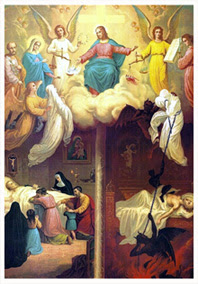

| Online: | |
| Visits: | |
| Stories: |

| Story Views | |
| Now: | |
| Last Hour: | |
| Last 24 Hours: | |
| Total: | |
TradCatKnight: Fear of Divine Justice by Bishop Conroy, 1891
FEAR OF DIVINE JUSTICE by Bishop Conroy, 1891
“For because sentence is not speedily pronounced against the evil, the children of men commit evils without any fear.”–ECCLES. viii. II.
Ask of the metaphysician, and he will tell you that the highest function of the mind is nothing higher than this faculty of comparison of relations. Inquire from the philosopher, and you will find that he reserves his praise for that system which teaches us to arrive at general laws by a calm and patient study of particular cases. Listen to the views of a great statesman, and you will find them valuable because they give correctly the bearings of one public act upon another. We should expect that to happen which we really find by experience, that for the reasoning man no act stands by itself, but that it leans on some other, or is the result of some other, or has in itself the virtue to produce some other. But to this rule is it not strange that there should be an exception? And is it not stranger still that this exception should occur in the matter which, of all others, by its transcendent importance demanded the strictest and most careful attention: I mean the commission of mortal sin. The children of men, says the text I have quoted for you, commit evils without any fear. And why?
Because they ignore the connection between sin and the punishment of sin; because they separate the crime from its penalty; because they make sin stand by itself, and then draw a curtain between it and the vengeance that follows after it, deliberately banishing that fear which would stir the veil. They teach themselves to think of sin without thinking of its punishment; they say to themselves, “I have sinned, and what harm has befallen me?” And so they go on losing that holy fear which is the beginning of wisdom, until at length they drink in iniquity like water. And how does this come to pass, my brethren? If we analyze the passion of fear we shall find that two distinct ideas go to form it–the apprehension of evil, and the persuasion that such danger threatens ourselves. To destroy fear of God’s punishment for sin we must teach ourselves either to believe that there is no such thing, or at least we must have no apprehension of its being likely to overtake us.
Now, the Catholic who sins without any fear does not, my brethren, abandon his faith in the existence of punishment for sin. For a man in such a state of sin has no terrors; he feels no fear in offending God; and, beloved brethren, the man who feels no fear in offending God, the man for whom sin is amere pastime, a thing of nothing, that man does not, at least consciously, believe that there is no punishment for sin. How could he? A God who does not punish evil is a God who shows Himself to be indifferent to evil, and a God who shows Himself indifferent to evil is a God who is regardless of the truth; for what is sin but a lie which falsely proclaims the creature to be more than the Creator, and a God regardless of the truth is no God at all. No! they admit that sin is to be punished. How, then, do they kill this salutary fear? Because they do not see God baring His arm for immediate vengeance after sin, because they do not see the punishment tread close on the sin, they persuade themselves that they have nothing to apprehend, that they may continue to drink in iniquity like water; and so without fear the wicked children of men commit evils against the Most High God.
If the murderer’s arm should fall powerless before his victim’s blood was yet dry upon it; if the blasphemer was stricken dumb before the sound of his evil words had died away; if a foul leprosy should suddenly fall upon the man who should be guilty of those abominations which the Apostle says should be unnamed among us, the sinner could not think of sin as separate from its punishment. But after his sin he finds himself as sound as before; the sun is made to rise as bright for the sinner as for the just; the rains of heaven fertilize the earth for him as well as for the saint ; the world’s beauty is as fair to his eye as to that of the holiest; in a word, he says: “I have sinned, and what am I the worse for it?” This is, indeed, a delusion, a most fatal delusion, but one for which there is no excuse.
Holy Job exclaims: “O that a man might so be judged with God, as the son of man is judged with his companion!” (Job xvi. 22). If this privilege, which Job sighed for in vain, were granted to such a man as the one we are just considering; if against God’s accusation he were allowed to enter a defense of his state of mind, as one man does when engaged in a lawsuit with another, think you, my brethren, that he could find any pretext which could serve to excuse him? To form an accurate judgment on this point, recall to mind the decision given in similar cases in Holy Scripture. “Behold, among His saints none is unchangeable, and the heavens are not pure in His sight. How much more is man abominable, and unprofitable, who drinketh iniquity like water” (Job xv. I5, 16). “Now they have no excuse for their sin,” says our Lord, of the world;–and why? “Because I have come and spoken to them.” “They are inexcusable,” says St. Paul of the pagan philosophers. And why? Because the things that are made testified and showed forth that divinity which they denied. That is to say, according to God’s views, the more numerous the witnesses and the clearer their testimony to any truth, the more inexcusable he who refuses to believe it.



